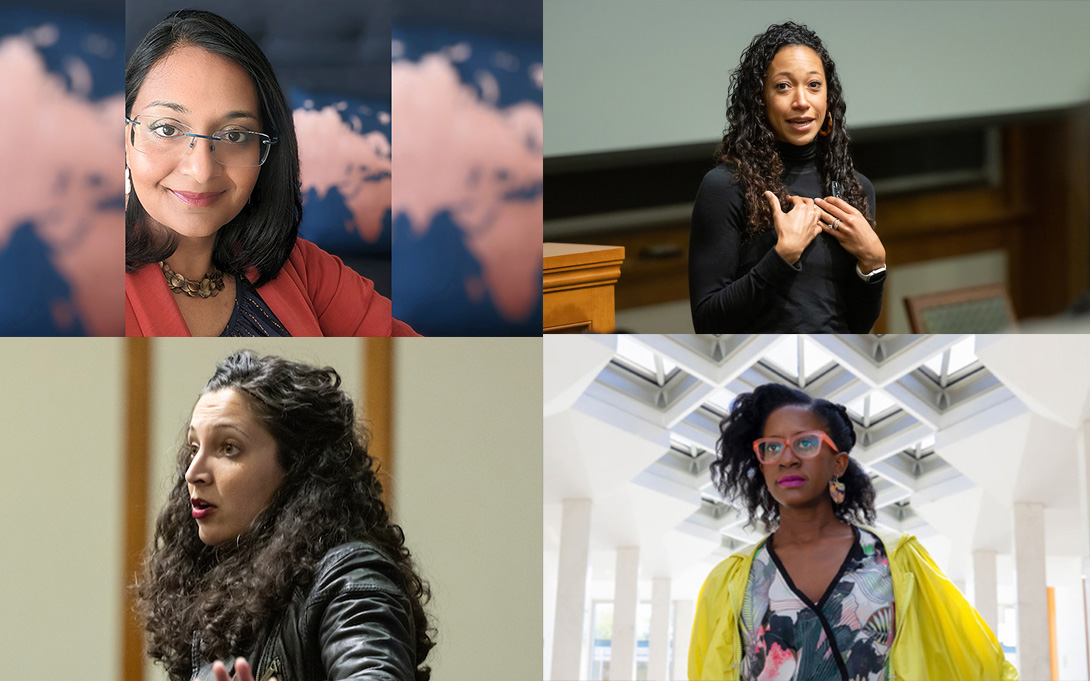
How do policy professionals apply racial justice in practice? This semester, the Ford School’s Center of Racial Justice hosted a series of workshops to explore different dimensions of justice, from antiracism and global development to community organizing. Four workshops were led by practitioners with on-the-ground expertise in these areas: performance artist Holly Bass; Niketa Brar (MPP ’15), founder of Chicago United for Equity; Farah Mahesri, founder of FNM Advising; and Gabrielle Wyatt, founder of The Highland Project.
“The Racial Justice in Practice series was conceived as a unique engagement opportunity for students, faculty, and staff to learn from high-impact leaders across diverse fields a set of strategies, frameworks, and best practices for activating racial justice work on the ground,” said Dominique Adams-Santos, assistant director of the Center for Racial Justice. “We are so thankful that Holly, Niketa, Farah, and Gabrielle graciously shared their wisdom and brilliance with our community.”
The workshops were open to the public, and attracted more than 120 members from across the U-M campus, as well as U-M alumni and Ann Arbor community members. In addition to the Ford School, students, staff, and faculty brought perspectives from kinesiology, public health, urban planning, social work, sustainability, information science, medicine, law, and art and design.
“The series attracted individuals from diverse disciplines and fields of practice, allowing for incredibly rich discussions on everything from international development to educational inequities and community wellness,” said Adams-Santos.
Holly Bass led a workshop–“Activating Joy: Creating Practices for Authentic Community Building”– framed around Toni Cade Bambara’s words, “The role of the artist is to make the revolution irresistible.” In Bass’s estimation, policy makers and change agents from diverse fields are well positioned to embrace this ethos as they make strides toward racial equity. During her workshop, Bass first explored the differences between activism, organizing, and culture shift work, and taught participants how to use creativity and joy to build authentic relationships with those most affected by potential policy changes.
Niketa Brar (MPP '15), is a policy strategist and activist who organized Chicago's first public Racial Equity Impact Assessment (REIA), a community process that set national precedent for stopping a school closure on the grounds of racial discrimination. She also designed the Vote Equity Project, an award-winning citywide voter guide built by thousands of residents, and co-created the People's Budget Chicago, a popular education model and community budgeting process. During her two-day workshop, participants learned how to use the REIA tool as a way to examine policy issues by acknowledging historical context, shifting power relations, and building accountability among relevant stakeholders. Participants engaged in a simulation that used a Chicago-based case study to mirror the process and dynamics at play when conducting a REIA.
“The REIA was a really useful tool, and required diving deep into decision-making around creating policy that tries to center equity amidst many unknowns in a way that was really powerful for me,” said Kyra Reumann-Moore (MPA ’23), who attended all four Racial Justice in Practice workshops. “I think it will stick with me as I encounter other challenging situations in work environments.”
Farah Mahesri drew upon her fifteen years of international development experience for her workshop on decolonizing development. Mahesri co-authored a 2018 report on the state of diversity among leadership teams in international development organizations. Mahesri’s workshop allowed participants to challenge common, pre-existing assumptions around global development practices and consider how organizations can structure programs to reimagine global development.
This session resonated strongly with Reumann-Moore who previously worked in international development. “I have been struggling with whether I want to go back to work in that space in part due to many of the problems that we discussed,” she said. “Mahesri’s optimistic vision for a liberated approach to development was inspiring. Her approach helped identify the right questions to ask and also left space for a range of approaches to challenge the current systems.”
Gabrielle Wyatt led “Changemaking from the Inside,” a workshop that explored creating change as institutional insiders. Participants discussed strategies for building and sustaining multi-generational change by exploring power, structural change, and leadership. Wyatt drew on her experiences as founder of The Highland Project, an organization focused on building and sustaining a pipeline of Black women dedicated to creating multi-generational wealth and change in their communities.
The Center for Racial Justice plans to continue the Racial Justice in Practice workshops series in Winter 2024, which will be led by the 2023-2024 CRJ Visiting Fellows.
More news from the Ford School